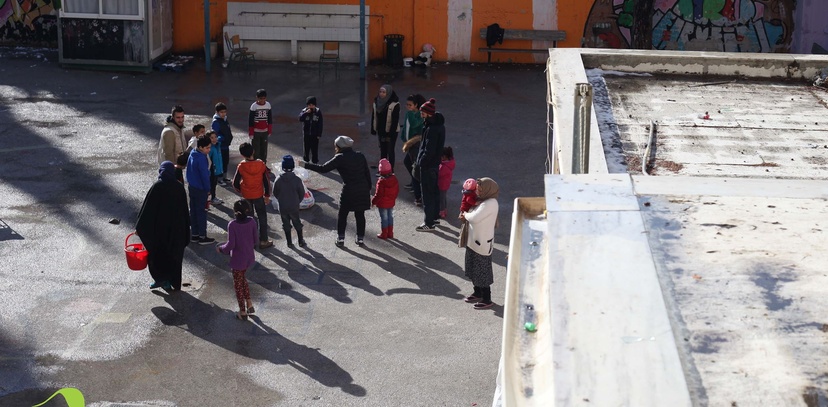
One of the most vital concerns for refugees and forced migrants when they flee their country of origin is where to find a safe and stable space in which to rest, eat, socialise, and sleep. With this in mind it is important to pay attention to the complex spatial politics that migrants are thrust into when they arrive in Europe. Here we look at Athens and London, and how migrants are supporting other migrants to rebuild their lives.
Whether migrants are viewed in positive or negative light, it is generally national citizens who are assumed to be the de facto hosts to immigrating communities. However a closer look at the social relations that emerge from and within communities of overlapping displacement in Athens and London, two major ‘host cities’ in Europe, forces us to reconsider who exactly is playing host, and where a significant amount of support provided to arriving migrants comes from.
The histories of both Athens and London have been characterised by large-scale immigration over the past 100 years, which continues with contemporary global trends.
In Greece alone there are 65,000 refugees and migrants whose chances of leaving for elsewhere in Europe were signficantly reduced when neighbouring countries closed their borders, in 2016 restricting access along the ‘Balkan Route’. As such many refugees are migrating to Greek cities in search of informal market opportunities and alternative escape routes. In Athens the abundance of abandoned buildings has stimulated this process, providing important shelter for a significant proportion for the one in ten refugees in Greece, who do not live in government camps or NGO shelters.
Disused schools, hotels and houses are popular among refugees and forced migrants in the Greek capital. The City Plaza Hotel for instance, which is located in downtown Athens and protected from police by anarchists, houses around 4,000 people. These spaces are often run by refugees themselves, who provide alternative physical environments to the camps run by the Greek State or major NGOs.
Jafra R2R is one such example. They are an international refugee charity run by refugees, who also offer housing to migrants in Athens. They have been squatting a disused school in the city, and more recently rehabilitated two floors of an apartment block to accommodate single women with or without children, who may be waiting for relocation or family reunification in other countries, seeking asylum in Greece, or simply unsure of their choices and options.
The shelter is located in Exarchia where many of the refugees congregate. It consists of two apartments each containing three bedrooms, a living room, kitchen and bathroom. The shelter provides free, secure accommodation, cooking and laundry facilities, a safe social space, and free advice and support.
These spaces, which are nearly always at capacity, are often hugely preferable to the Greek refugee camps offered by the more traditional host (nation, state and citizens), where migrants this year have frozen to death and committed suicide during a particular cold and hopeless winter.
The participants of these alternative refugee-led spaces must also be recognised as active agents and providers of aid for many new arrivals in Greece, rather than assuming the citizen or state as the sole host, by way of national status or official provision alone.
In London by contrast, buildings are generally intensively used and although there are empty properties, these are not available to be repurposed. Homelessness continues to grow in London, affecting the lives of many forced migrants in the UK. The Conservative government’s aim to make £12bn of welfare reform savings, equivalent to a 79% cut, by 2019-20, alongside wider austerity policies, have already made a heavy impact: since 2010 the number of people sleeping rough has more than doubled to just over 8,000 in the capital.
Because of legal changes, migrants who have been living in the UK for as long as 10 years are increasingly receiving eviction notices from their landlords, for some this can lead to deportation. The result can be extreme poverty and destitution.
In such cases many forced migrants, rejected by formal welfare support, turn to other migrant communities, who may host friends or family on the floor of their homes, rooms, churches or even together on the street. In London a growing number of refugees sleep in groups under bridges or in train stations, welcoming new arrivals to the capital into the informal public spaces they are forced to reshape as (a very loose understanding of) home.
In cases where migrants find themselves destitute in the London, it is more often than not migrant communities, who, despite their own vulnerability, provide a significant proportion of support for those suffering extreme marginalisation.
Although it is important not to idealise refugee-to-refugee relations, which often carry discriminatory politics of their own, urban refugee support networks are a common and vital resource for many forced migrants across Europe, and indeed the world.
This prompts us to recognise that newly displaced populations not only share spaces with or aim to integrate into communities of ‘nationals’, but also with and into communities formed by established or former migrants of similar or different groups.
The reality of refugee-to-refugee host relations in Athens and London, two distinct but major host cities for thousands of migrants in Europe, forces us to reconsider the notion of legal citizens as the de facto hosts of non-citizens, and reposition forcibly displaced people as both the hosts and active participants in the integration of new arrivals.
Photograph from Jafra Team R2R in Greece - فريق جفرا في اليونان